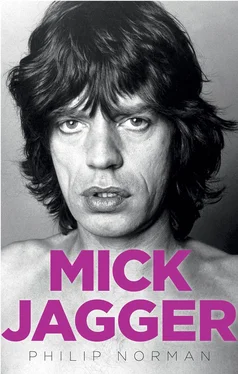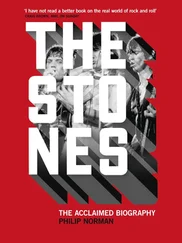– from Jacqui Graham’s diary
Chelsea had lost Mick, for now anyway. Under Andrew Oldham and Eric Easton’s management, the Rolling Stones received around £20 each per week, the same as most top British soccer players of that era. The three Edith Grove flatmates therefore could move on from the squalid pad where they had frozen and half starved – but also shared an idealism and camaraderie that were never to be revived.
Treading his usual fine line between sex addict and sex offender, Brian Jones had impregnated yet another teenage girlfriend. The mother of this, his fourth child by different partners – due to arrive in summer 1964 – was a sixteen-year-old trainee hairdresser named Linda Lawrence. In a surprising reversal of his usual tactics, Brian did not instantly desert Linda but showed every sign of standing by her and the baby and, still more surprisingly, went to live with her at her family’s council house in Windsor, Berkshire, where Mick had first wooed Chrissie Shrimpton. So fond of this prospective son-in-law did the Lawrences become that they named the house ‘Rolling Stone’ in Brian’s honour and also gave board and lodging to a white goat he bought as a pet and liked to take out for walks through Windsor on a lead.
It went without saying that Mick and Keith would continue living together. However, treading his usual fine line between authority figure and honorary bandmate, Andrew Oldham put forward the idea, or instruction, that he should join them. Svengali needed to be as close as possible to the Trilby he was moulding day by day.
Trilby, as a result, migrated from trendy Chelsea to the more prosaic north London district of Willesden. The new flat was a modest two-bedroom affair on the first floor of 33 Mapesbury Road, a street of identical 1930s houses with even less charm than Edith Grove – though immeasurably cleaner and quieter. Mick and Keith were the official tenants, while Oldham came and went, staying part of the time with his widowed mother in nearby (and more desirable) Hampstead.
Rock musicians’ neighbours are usually condemned to purgatorial nuisance, but with Jagger and Richard, Mapesbury Road got off lightly. For much of the time the pair were away on tour, and when they returned they would sleep for twelve or fourteen hours at a stretch. Their fans had no idea where they were living, and none yet possessed the gumption to find out. There were no riotous all-night parties, no revving cars or motorbikes or onslaughts of deafening music, not even the tiniest tinkle of breaking glass. There was no drug taking whatsoever at this stage, or even very much drinking. ‘A half bottle of wine in that place,’ Oldham would remember, ‘was a big deal.’
Since Mick had been swept up into his new pop-star life, his parents back home in Dartford had hardly seen him and, apart from the increasingly unflattering stories they read in the press, had no idea where he was or what he was doing. When Oldham commandeered the Stones, he did not have to sell himself as a responsible manager to their respective families the way Brian Epstein had, painstakingly, to the Beatles’; Oldham, indeed, had not even met Joe and Eva Jagger, and initially left all dealings with the couple to his associate Tony Calder. ‘One day,’ Calder remembers, ‘a call came through to the office, and this very polite voice said, “My name’s Joe Jagger. I understand that my son is getting rather famous. If you need help of any kind, just let me know.” I took calls from so many angry, hysterical people every day . . . I couldn’t believe I’d just been talking to somebody who was polite.’
Liaison with Joe and Eva improved when Oldham employed seventeen-year-old Shirley Arnold, a long-time loyal Stones supporter around the club circuit, to organise their fast-growing national fan club. Shirley joined the small Oldham enclave inside Eric Easton’s office in a Piccadilly office block called Radnor House. Also among the staff was Easton’s elderly father-in-law, a Mr Boreham, who advised clients on long-term financial planning. Shirley remembers Mr Boreham’s amazement after a consultation session with Mick. ‘He said Mick had asked him what he thought the pound would be worth on the currency markets in a few years’ time. That was something no one in the music or entertainment business thought about in those days.’
Henceforward, Shirley kept Joe and Eva fully updated about their son, finding them ‘lovely people’ who never made the slightest demands on their own account or expected to profit from his success. ‘Eva was the dominant one in the marriage, very conscious of what other people thought, and to begin with she wasn’t sure what to make of all the headlines. But Mick’s dad was always totally laid-back about it all.’
Brian Jones might cut a dash with his pet goat on the streets of Windsor, but elsewhere he was finding it increasingly hard to win the attention he craved. Ironically, the Stones’ takeover by professional managers that he had wanted so desperately had eroded almost all his former power and status as the band’s founder, chief motivator and creative driving force. While they were still struggling to break through, Brian had a certain value to Oldham and Easton as an ally within their ranks, and so could wangle preferential treatment in pay or hotel accommodation. But now that they had made it his doom was effectively sealed.
Knowing in his own mind what a star he was, he could not understand why Oldham should be devoting such time and trouble to Mick, or why audiences responded to the results with such fervour. ‘Brian would come into the office to collect his fan mail,’ Tony Calder remembers, ‘and there it would be in a little pile, with a dirty great pile next to it. “Who’s that other lot for?” he’d say. “They’re for Mick,” I’d say. Brian would storm out in a fury, not even taking his own fan mail.’
One way of fighting back would have been to compete against Mick in onstage showmanship, as lead guitarists often did against vocalists. But with curious perverseness – the same that made him go and live with his girlfriend and goat in Windsor rather than at least try to preserve the old solidarity of Edith Grove – Brian in performance struck none of the melodramatic or flamboyant poses that normally went with his role. Throughout the Stones’ set, he stood rooted to the stage with his lute-shaped Vox Teardrop guitar, as innocent-looking as some Elizabethan boy minstrel, giving out nothing but an occasional enigmatic smile. It was a technique that seldom failed him with individual females in intimate one-to-one situations, but in front of eight or nine thousand going crazy for Mick’s duckwalk, it was an ill-advised tactic.
The erosion of Brian’s leadership did not end there. Until now, he had always been the spokesman for the band in the quiet, cultured voice which, unlike Mick, he never slurred into faux Cockney. But Oldham considered him long-winded and – as an inveterate hypochondriac – too prone to ramble on about his latest head cold. So, with great reluctance at first, Mick began to do the talking as well as the singing (Keith being regarded, in both areas, as totally mute). ‘If Andrew told Mick, “You’ve got two interviews today,” his response would always be “Are you sure they want me?”’ Tony Calder remembers. ‘Andrew rehearsed him in talking to journalists just like he rehearsed him in how to perform.’ Under the rules of early-sixties pop journalism, this generally meant no more than reciting a press release about the Stones’ recording and touring plans. It also meant showing a deference scarcely in his nature to interviewers whom Oldham particularly needed to cultivate. When the New Musical Express ’s news editor Derek Johnson turned up in person, a well-briefed Mick shook his hand and said, ‘Nice to meet you, sir.’
Читать дальше












